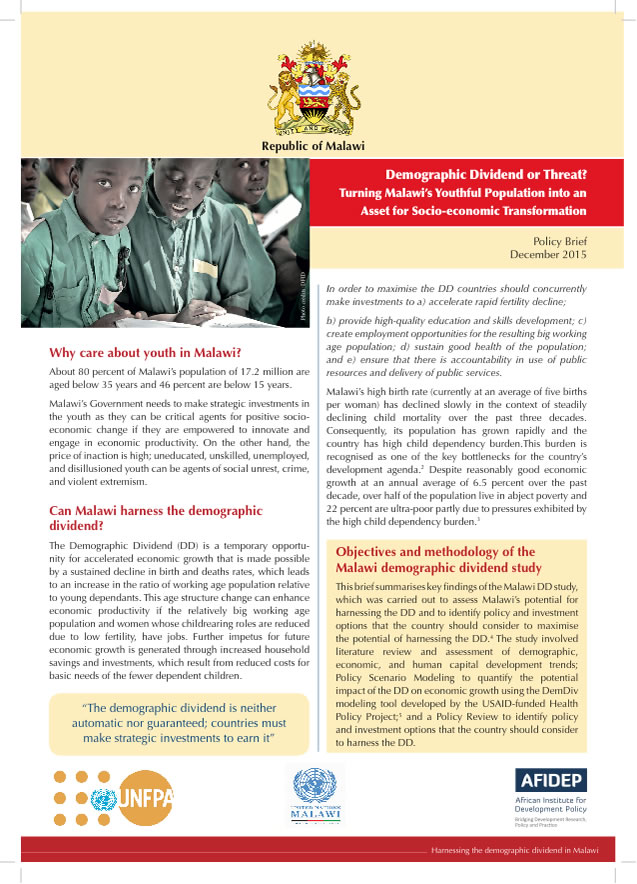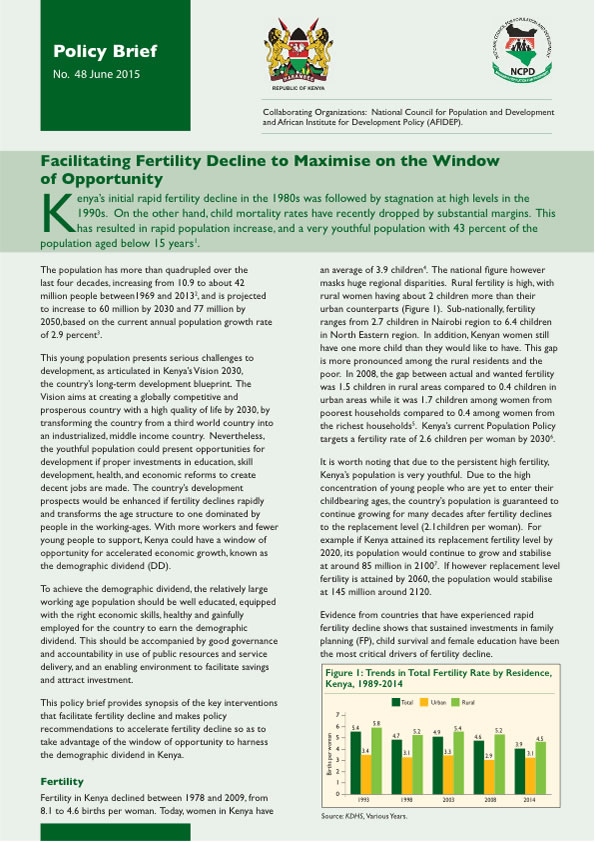Policy Briefs

About 80 percent of Malawi’s population of 17.2 million are aged below 35 years and 46 percent are below 15 years. Malawi’s Government needs to make strategic investments in the youth as they can be critical agents for positive socio-economic change if they are empowered to innovate and engage in economic productivity. On the other hand, the price of inaction is high; uneducated, unskilled, unemployed, and disillusioned youth can be agents of social unrest, crime, and violent extremism.

Globally, key and mobile populations are exposed to numerous health risks and vulnerabilities due to risk factors such as risky sexual behaviours, low-risk perception, high levels of mobility, unsanitary accommodation, and inadequate access to health and social services. In the East Africa Community (EAC) region, these challenges are further compounded by the limited access to comprehensive health care along the transport corridors.

Kenya has one of the most youthful populations in the world with about 43 percent of its population under the age of 15. The youth population is growing fast and the country is experiencing a youth bulge; an excess especially in young population aged 15-24. These young people are an important resource for economic growth and present a window of opportunity to earn the demographic dividend.

Kenya’s initial rapid fertility decline in the 1980s was followed by stagnation at high levels in the 1990s. On the other hand, child mortality rates have recently dropped by substantial margins. This has resulted in rapid population increase, and a very youthful population with 43 percent of the population aged below 15 years. The population has more than quadrupled over the last four decades, increasing from 10.9 to about 42 million people between 1969 and 2013, and is projected to increase to 60 million by 2030 and 77 million by 2050, based on the current annual population growth rate of 2.9 percent.

All Kenyan’s have a right to the highest attainable standard of health and health services including reproductive healthcare. This right is enshrined in The Constitution of Kenya 2010 article 43(a). Further, Kenya’s long-term development plan, Vision 2030, identifies good health as part of its overall objective – to create a globally competitive and prosperous nation with a high quality of life by 2030. Investment in health is also a prerequisite to harnessing a substantial demographic dividend.

A strong, dynamic and empowered youth is critical in catalyzing and driving the transformations envisioned in the Constitution of Kenya, and the Kenya Vision 2030. The youth aged 15-24 constitute an important segment of Kenya’s population, accounting for 35.4 percent of the total population and 66.7 percent of the adult population in 2009. This policy brief points out how Kenya can harness the youth potential in order to achieve the demographic dividend through highlighting the skills supply mismatch, unemployment and underemployment-, job creation and existing opportunities for the youth in Kenya.

A well-educated, highly skilled and healthy labour force is essential to propel Zambia to a thriving, industrialised and services-based economy that is envisioned in Vision 2030. Central to Vision 2030’s goal of transforming Zambia into a prosperous middle-income country are investments in human capital development to improve the education and skills level of its people and ensure they are healthy.

Zambia‘s Vision 2030 seeks to turn the country into a prosperous industrial middle-income nation that provides opportunities for improving the well-being of all its citizens. The country has experienced steady economic growth in the past decade, averaging at 6.7 %, and graduated into lower-middle-income status in 2012, with a per capita GDP of $1,839 in 2013.

Zambia’s fertility has declined slowly in the context of steady decline in child mortality over the past three decades. Consequently, 45% of the population is under 15 years of age, which has resulted in a high child dependency burden.

Uganda’s young age structure can be turned into a valuable asset for achieving the socio-economic transformation envisaged in Vision 2040 if birth rates decline rapidly. This will create a population with more working-age people than children, which can accelerate economic growth if accompanied by investments in education, health, economic reforms to create quality jobs, and accountability in service delivery and use of public resources.

This Policy Brief provides an overview of the findings of a situational analysis conducted in July 2014, on health and HIV/AIDS to support the development of a regional strategy for integrated health and HIV programming along the East Africa Community (EAC) region transport corridors. It highlights existing gaps in and opportunities for improving service delivery along the EAC transport corridors with a specific focus on migrant and mobile populations.

A few countries in the East and Southern Africa regions are making good progress in improving contraceptive use. Ethiopia, Malawi and Rwanda have exhibited a new wave of optimism and made good progress in addressing barriers of access to modern contraception over the past decade or so. So what can we learn from these countries?

